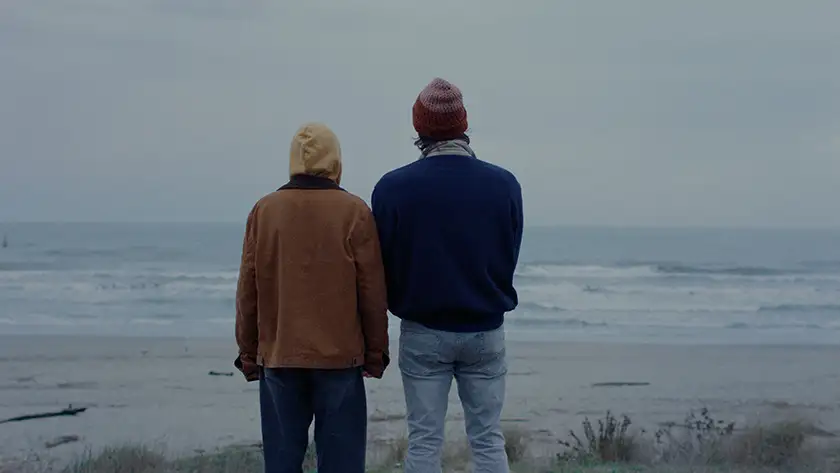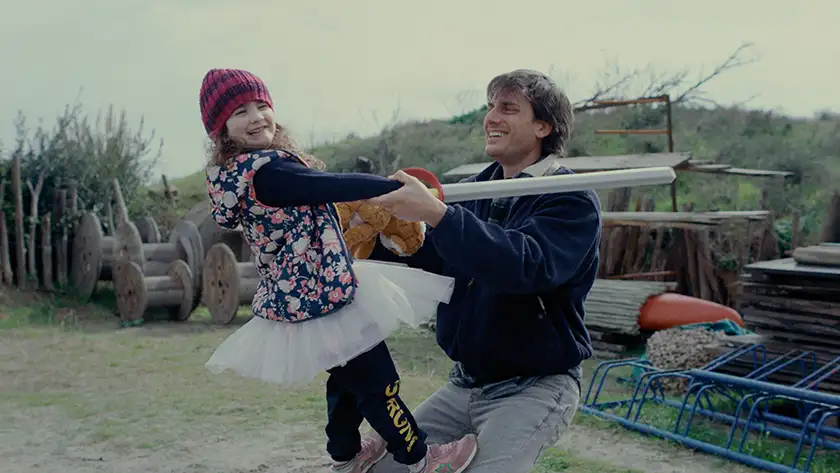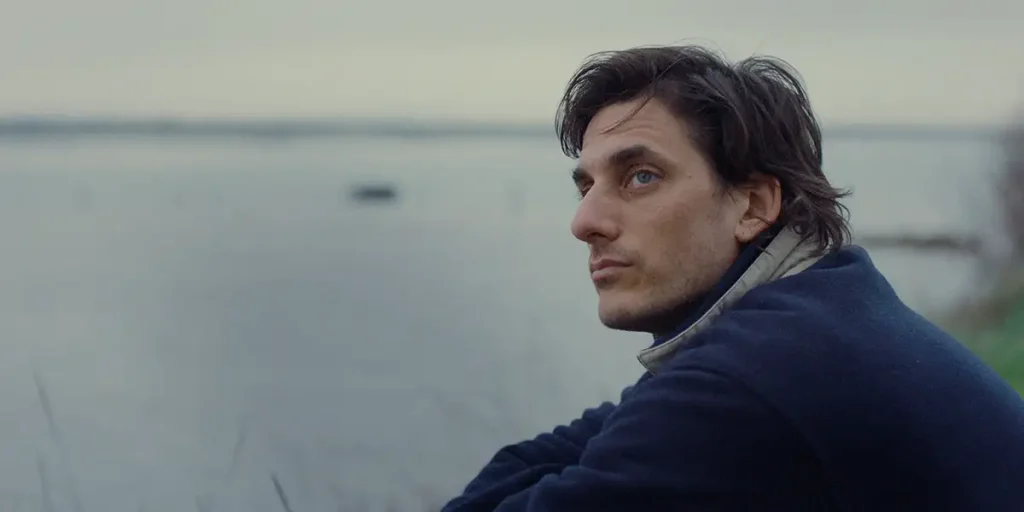In this interview with Luca Marinelli about the Berlinale-premiering Paternal Leave, he tells us about fatherhood, the special team who made the movie, working with director Alissa Jung, and more.
Alissa Jung’s Paternal Leave is about a father and a daughter who meet for the first time after having spent fifteen years apart. But what kept them apart for all this time is not an insurmountable obstacle, but rather, poor decisions that were made out of fear. Back when Leo (Juli Grabenhenrich) was born, Paolo (Luca Marinelli) ran away; when we meet him, he lives in Marina Romea, Italy, with a daughter of his own (Joy Falletti Cardillo’s Emilia) that was born out of another failed relationship. The film begins when Leo leaves her home country of Germany, having decided it’s time to meet her father even if she doesn’t exactly what she’s going to tell him. From there, we watch them try to communicate with each other, and eventually have a conversation that should have taken place a long time before, but that might still be the beginning of something important for both.
Paternal Leave had its World Premiere at the 2025 Berlin Film Festival, where the film won the AG-Kino Gilde Cinema Vision 14Plus award. At the Berlinale, we speak with Luca Marinelli about the “special people” who made the movie, working with writer-director Alissa Jung (who’s also Marinelli’s wife), our society’s obsession with the idea of the “good” father, his character’s journey in the film, shooting in Marina Romea, and more. Read the interview below and click here for our review of the film!
How Luca Marinelli Becomes a New Character
Congratulations for this beautiful film! This is such a different role from the character you play in Mussolini: Son of the Century, which international audiences are just starting to discover now. What does it feel like to leave that character behind and delve into this much more introspective, subtler role?
Luca Marinelli: The way I see it, every film you make eventually ends. It might take a little longer to leave a character behind, or to close that chapter completely, but, eventually, you do, and something else begins. I always enjoy [this part] a lot. We stopped filming Son of the Century at the end of May, and in December I was already in Morocco to learn how to surf, in preparation for this film [there’s a scene in Paternal Leave where Paolo teaches Leo how to surf]. I was really excited to feel like myself again and begin a new adventure. It happens with every movie. When I’m approaching a new role, there’s always a point when Alissa tells me, “It’s starting” [as in, “you’re starting to feel like this new character”]; when you’re working on a new movie, you start seeing things in a new light, as if it was filtered by the character. It can be demanding or painful at times, but there are also times when it’s a brighter, happier sort of adventure.

Luca Marinelli on Fatherhood, Patriarchy, and the Main Relationship in Paternal Leave
One of the things that really surprised me in Paternal Leave is how it manages to capture a kind of masculinity that I find so typical of Italy in particular, especially thinking of relationships. For example, the issue we have of keeping all our emotions inside, only for them to explode all of a sudden at some point, when we end up saying a lot of hurtful things that we don’t really mean. Or being so scared of everyone’s judgement that you end up not saying anything at all – and you’re only able to say what you feel when there’s a literal wall between you and the other person.
How did you work on the character’s inner world and struggles?
Luca Marinelli: I think that a huge problem in our society is this patriarchal aspect, which is just terrible. Something people ask themselves all the time is, “What does it mean to be a good parent, a good father, or a good mother?,” when what you need to be, really, is quite simply a mother or a father. Why do we need to place the word “good” before it? In our society, a “good” father is someone who need to bring home the money, to have a certain kind of job, and to behave in certain ways. I think that this has ruined generations of people who don’t really know how to meet expectations that are absurd, ancient, and also violent and hurtful. Because it would actually be great to just be a father or a mother, without having to prove anything.
Perhaps this is also, in part, what makes Paolo want to run: he feels like he has to be a good father, but that he doesn’t know what it means. And so, he sadly decides to leave instead of facing the challenge of crafting his own version of a father. The film is open ended, and my hope is that, at the end, thanks to this beautiful young woman who comes into Paolo’s life, he can finally see himself through the mirror that his daughter placed in front of him and be his own version of a father – a version that would make both Leo and himself feel good.
I agree. It’s a theme that I feel the film approaches very well, not just in the evolution of Paolo and Leo’s relationship but also in Paolo’s character arc.
L.M.: Paolo is someone who’s really struggling; his reaction is always to leave and escape because he feels inadequate, and we can even empathize with him a little bit, perhaps. But we meet him at a time when he’s trying, like he says, to put his life back together and fix things, even in that clumsy, reckless way of his. He’s really so goofy and dumb, at times, like when he tells his daughter that he doesn’t want her to mess things up [with a boy she has just met, and with whom he thinks she’s romantically involved] the way he did with her [by having a child at such a young age]; sometimes he’s just incapable of being sensitive. He doesn’t have the sensitivity to understand that perhaps his daughter isn’t the best person to confide in about this subject. It’s like “traveling” inside a person who’s stumbling everywhere, and who’d like to keep standing but who doesn’t realize that his daughter is actually just asking him to be present, and not to actively help her, as he’s been absent from her life for fifteen years.
You’re right: Leo is always depicted as a character who already has an identity before she meets Paolo.
L.M.: It’s been beautiful to explore them together. There’s a scene that always moves me so much, and which I find so beautiful in its simplicity. It’s when Paolo asks Leo if she wants him to take her home, and after a pause, she says “no”. It’s as if she were saying, “Right now, I don’t need you to take me home; we’ve gotten to the place we are now, and that’s enough.” And I think that’s beautiful, too: how you can take and give space, and respect yourself enough to say “no,” like Leo does.
It’s a very adult thing to say.
L.M.: Yes, it is. It’s true: she’s the adult, out of the two of them.
Luca Marinelli on Working with Alissa Jung and the Role of a Director
What was it like to make a film with Alissa?
Luca Marinelli: It was wonderful. We actually asked ourselves the same thing, you know? Like, how do you work with someone who’s also your partner? I think we were both very professional, which was important. I did what I always do: I read the script, which she sent me exactly like you’d do with other actors – almost through an agency. We kept being professional in every stage of the project, and it was really great to shoot together. If there’s someone I trust completely, it’s Alissa. We have the same taste, almost the same vision, we see things the same way and even feel the same things. I often make films with people I trust, but whom I know, say, 5% of the way I know Alissa. This time around, it was a very natural, spontaneous way of trusting someone, which didn’t cost me anything. And I’m so happy [we made this film], because she’s a fantastic director, and I truly wish her the best in the future [in her professional career]. I hope we can work together again, if she’ll want to!
Since you and Alissa know each other so well, did she ever give you any notes that stood out to you? For example, something that was really funny or unexpected?
L.M.: Oh, no. This was actually the real tragedy [laughs]: she knows me so well that I wasn’t allowed to get comfortable. You know, sometimes I’m able to cheat – to deceive both myself and others while shooting a scene [by acting in a way that requires less of an emotional effort but still delivers a good scene], but here, I was never able to do that. I couldn’t “hide” anywhere, so it was very challenging, but also wonderful… Because one always tends to get “comfortable,” and that’s always a mistake.
As a viewer, you can really tell that there was such a strong collaboration behind this film.
L.M.: To me, what makes a director’s work so difficult is that you have to be like the commander of a boat that’s navigating these waters without really knowing where to go. You know the route, but you don’t know what the weather will be like, for example. Alissa was so great in creating a fantastic team, and making everyone feel important – because they are! This was our strength: she made us stronger, because she made all the difference, as our guide.
Speaking of directing, you’ve just finished directing Kafka’s “Una Relazione per un’Accademia” at the theatre, in Perugia. Do you think you’ll ever want to direct a film too?
L.M.: I’m not sure. Maybe not, because it’s very demanding, but it could also be fun. For now, there was this theatre thing, which I really enjoyed even if it was challenging, as I had never been, let’s say, on the other side. It gave me even more respect for the role of a director, who needs to think, listen, say, and give so much all the time.
Paternal Leave was Made by “Special People”
What was the first scene you and Juli Grabenhenrich, who plays Leo, shot together?
Luca Marinelli: I think it was actually the first scene [of them together that we see in the film, which won’t be spoiled in this article]. We were lucky enough to rehearse a lot before we started shooting. When time came to start filming, we were prepared, but being on the set is a completely different thing. In rehearsals, it’s just three people in a room. On the set, there are forty people in one noisy location, it’s cold, there are so many people there with you: the atmosphere changes. It’s up to you to bring that sort of intimacy into something that’s bigger, and apparently colder [than what you need to show].
We were so lucky to have so many people working on the film who deeply loved it. We were a small crew, but it was made of such truly special people: they loved the film, and they even came to Berlin to watch the screening! It feels like the birth of a small team of people who might even collaborate again in the future. It would be really wonderful, like a theatre ensemble of sorts.

You’ve spoken a lot, in interviews, about your working with Juli, who’s just incredible in the film. I’d like to also ask you about Joy Falletti Cardillo, who plays your character’s younger daughter Emilia. What was it like to work with her?
L.M.: So wonderful. Naturally, July was older when we made the film – she was 14 or 15 years old – and had a different control over the character. She brought such honesty and authenticity to the character that made it such a challenge for me to act alongside her: sharing a scene with someone who’s so honest and raw [raises the bar for an actor]. With Joy, it was even stronger, because she brought even higher levels of honesty, and also the self control of a trapeze artist! Being with her was so great. Joy gave us such magical moments, due to her age but also to how sensitive she is. Alissa had a big casting with so many children around her age, and Joy was chosen for her beautiful soul. You can see it in the moments that ended up in the film, which are so “big”. She also trusted me: I remember that, when we filmed the singing scene, she nearly fell asleep for real! There were Joy and I, and then there was her mum sitting in the front; she trusted us and played with us, and it was so beautiful.
Shooting Paternal Leave in Marina Romea
As someone who was born in Emilia Romagna, the same region of Italy where Paternal Leave was shot, it was such a surprise to see my region represented – and represented well! What was it like to film in Marina Romea?
Luca Marinelli: It was so important for me to be there, because this is a place that’s insane and incredible in the summer; it’s full of people, colors and music. And then, in winter, it becomes a very solitary place. We got to see Marina Romea in all its seasons, and it becomes such a peculiar place in winter: it’s very cold, humid and foggy, but sometimes you get some glimpses of summer, even in the winter, and those are so beautiful. Still, the real “sun” are the people who live there, who are just amazing people. We spent a lot of time in this place called Quartier Generale [a restaurant and ice cream bar], which is a fantastic place. We became friends with the people there, who gave us some t-shirts as gifts. Mine read, “I acted in a movie in Marina Romea,” and Alissa’s said the same thing but with the word “directed”. We are so proud of these t-shirts and it was wonderful to meet everyone there.
I actually went to Morocco to prepare for the role and I even met someone there, in the water, who was from Marina Romea! It was like this place was calling us back all the time!
Were you there to learn how to surf? Was it fun?
L.M.: It was fun, but frustrating, because I hardly ever managed to catch a wave! [laughs] But pretending to be a surfer is great too!
Thank you so much for speaking with us!
This interview was conducted in Italian and translated to English, and edited for length and clarity.
Paternal Leave premiered at the 2025 Berlin Film Festival, where it won the AG-Kino Gilde Cinema Vision 14Plus award, and will open in Italian cinemas on May 15, 2025. Read our review of Paternal Leave below!

